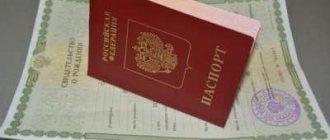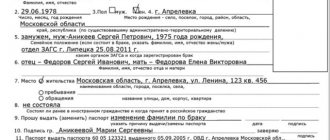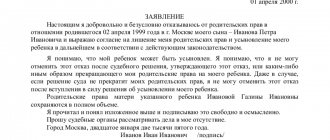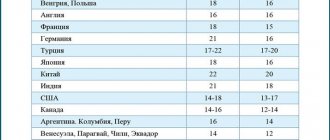Having a child in the family imposes many responsibilities on his parents (or guardians). For systematic evasion of these, Russian legislation provides for a system of punishments. Within the framework of the article, we will consider what responsibility parents are supposed to have for minor children.
Normative base
The responsibilities of parents towards children and the responsibility imposed for their actions are regulated by the following documents:
- International Convention on the Rights of the Child ();
- Family Code ();
- Civil Code ();
- Code of Administrative Offenses ( );
- Criminal Code (–).
Measure of parental responsibility
Domestic legislation rightfully classifies children as the most vulnerable categories of citizens, therefore their rights and interests must be protected as a priority.
By forcing parents to properly raise their children, the state pursues several goals: to raise worthy citizens, to protect society from illegal acts of minors, to punish adults who have not fulfilled their responsibilities towards their offspring. Parents living separately from minors are also held accountable, since this fact does not relieve them of the responsibility to properly raise their child.
Parental rights end when the teenager reaches 18 years of age or earlier upon actual acceleration. At the same time, the citizen’s parental responsibilities towards his son or daughter are terminated.
On the rights of a legal representative of a minor
You can consider what rights a legal representative has using the example of the participation of a minor in criminal proceedings. A citizen can:
- attend interrogations;
- monitor compliance with the rights of persons under 18 years of age;
- attend meetings and hearings;
- understand and explain to the child what he is accused of;
- submit challenges and petitions in a timely manner;
- receive notifications and become familiar with them;
- hire a lawyer and cooperate with a lawyer;
- sign documents on behalf of the child.
Read also: Deprivatization of apartment 2021
The legal process involving a minor and a guardian has a number of complexities.
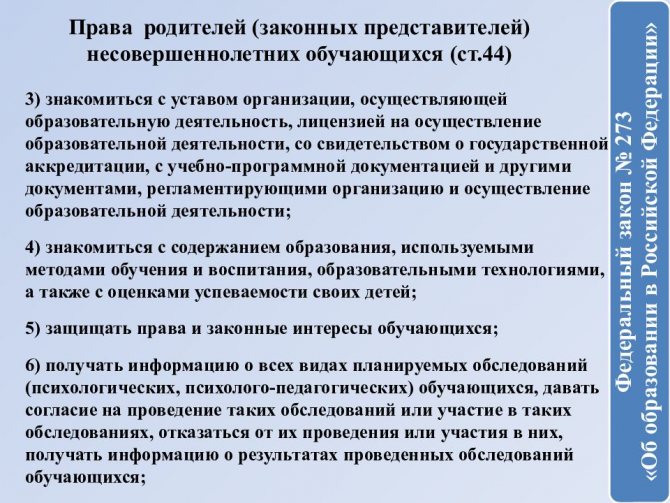
On the rights of a legal representative of a minor
Types of liability
All parents and guardians of Russian minors bear two types of responsibility:
- For unfair actions towards a child.
- For the actions of your children (wards).
If everything is more or less clear with the first point (every parent knows that they must feed, clothe, educate, socialize and care for their child), then the second still raises many questions among adults and children.
Some teenagers, due to improper upbringing and early acceleration, demand greater freedom of action, not realizing that expanding rights automatically leads to increased civic responsibilities and responsibility for their actions.
Growing up of a minor entails an increase in the citizen's legal capacity. The moment of its occurrence is recorded in:
- – full legal capacity beginning at the age of 18;
- – partial legal capacity, which appears from the age of 14.
Not everyone understands that partial legal capacity presupposes the responsibility of a growing Russian for committing any illegal acts. The argument of fathers and mothers: “He’s still small!” does not work in these cases. Depending on the severity of the offense, the teenager may be held administratively, civilly or criminally liable.
For parental responsibility to arise for the actions of a minor, one unlawful act by the teenager is sufficient. Responsibility for violation of the rights of a child or improper upbringing occurs if the actions of the parent (guardian) are systematic.
Who is the legal representative of a minor in criminal proceedings?
According to Part 1 of Art. 20 of the Criminal Code, criminal liability is imposed on a person who has reached 16 years of age at the time of the crime. In Part 2 of Art. 20 of the Criminal Code specifies the crimes for which citizens over the age of 14 are punished.
Read also: Disputing paternity
Based on Art. 48 of the Criminal Code of the Russian Federation, the legal representative for a child who has committed a crime is adoptive parents, guardians, parents and trustees. Only an investigator can attract these citizens to participate in criminal proceedings by order. The representative has the right to attend meetings and interrogations.
During the trial, he can familiarize himself with materials, draw up complaints and petitions, collect and provide evidence of the ward’s innocence of a criminal offense.
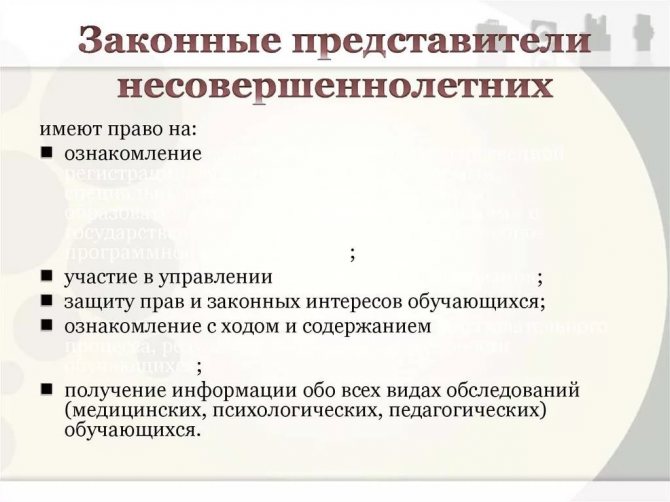
The minor's representative has the right
Features of actions during interrogations
Representatives of a minor in criminal proceedings are obliged to protect his interests and rights. During interrogations, responsible citizens have the following powers:
- receive information about the details and nuances of the case;
- present at the arraignment;
- study procedural acts and make adjustments on their own behalf;
- are close to the ward when he gives evidence;
- provide explanatory materials.
Only a court can remove a legal representative from participation in a case. The basis will be the person’s actions not aimed at protecting the child. The judicial authorities may appoint another representative for the accused.
Administrative responsibility
Administrative offenses of adults and adolescents are similar. Types of frequently occurring illegal acts:
- drunkenness, use of psychotropic substances;
- appearing in a public place or on the street while intoxicated;
- violation of traffic rules;
- petty theft;
- antisocial behavior;
- causing minor bodily harm.
Adolescents who have reached the age of 14 are subject to full administrative liability. Punishment for the committed offense is chosen in accordance with the norms of the Code of Administrative Offenses of the Russian Federation. In particular, for improper actions the minor will be liable with his own property (to compensate for the harm caused) or bear labor service.
If the perpetrator cannot compensate for property damage on his own due to the lack of his own income, his parents (guardians) will have to do this. The decision about who will pay is most often made on a voluntary basis. If parents refuse to compensate the injured party, they may be forced to do so in court.
The exception is cases when it is proven that the teenager who committed the offense was at that moment under the control of another person (for example, a teacher leading classes at school, a teacher at a children's camp, etc.). Then responsibility for its action, and, consequently, the need for compensation for damage, will fall on the relevant institution.
Parents will also be held administratively liable if the child is under 14 years of age.
The amount of administrative punishment depends on the severity of the act. If the teenager’s actions did not cause material damage, the court will limit itself to issuing a public reprimand or warning.
Any material damage is subject to compensation.
In addition, the perpetrator may be subject to a fine ranging from 30 to 100% of the minimum wage. For more serious offenses or the commission of several offenses at the same time, the fine will be 3-5 minimum wages. Also, in relation to the perpetrator, the court can choose a preventive measure in the form of arrest for a period of 15 days (nowadays it is rarely used).
Parental responsibilities
In order to understand when a child’s legal representatives have an inappropriate attitude towards his upbringing, it is worth clarifying the positions that they must fulfill in accordance with the norms of the Family Code of the Russian Federation:
- personal participation in the development and education of one’s own child;
- the use of educational methods that do not contradict the law, the interests of children and their safety;
- promoting the successful psychological, physiological and spiritual development of the child;
- creation of conditions necessary for the full provision of minors;
- protecting the rights of the ward in courts and other institutions where the participation of a representative is necessary.
In fact, parents are obliged to promote the comprehensive development of the child, support and guide him in difficult situations, and explain what is good and what is bad. Therefore, if a minor violates the established norms of the law and society, his mother and father will be primarily responsible, because antisocial behavior is a consequence of their actions or inaction.
Civil responsibility
The extent of parents' property liability for any harm caused by the child's actions to third parties depends on the nature of the offense and the age of the child.
Damage caused to minors under 14 years of age is compensated by parents in full. This applies, for example, to damage to goods in a store, a broken window at a neighbor’s house, etc. Teenagers 14-18 years old compensate for property damage on their own, since they are already partially capable. If the amount of damage caused is large or the child does not have income to cover it (which happens most often), the parent (guardian) will also have to compensate for the damage or loss of property.
Citizens deprived of parental rights may also be involved in compensation for damage caused by their offspring. In this case, no more than 3 years must pass from the moment of deprivation of rights.
When does responsibility pass to the parents?
Until how many years parents are responsible for their children depends on the offense committed . In fact, full legal capacity in the country begins at the age of 18. Until this time, children are considered minors. However, for example, for particularly serious crimes, responsibility comes much earlier.
Parents can only be held responsible for their children in civil proceedings for compensation for damage caused.
If a child kills a person, of course no one will put his parents in prison for this . But they may well be forced to pay monetary compensation to the injured party.
In Art. 1073 and 1074 of the Civil Code of the Russian Federation indicate those persons who are responsible for the actions of minors. In this context, the legislator divides minors into minors - up to 14 years old and minors - from 14 to 18 years old.
The following categories of citizens may be held responsible for minors:
- Parents;
- Guardians and trustees;
- Employees of educational or medical institutions;
- Employees of organizations for children who are left without parental care;
- Other organizations that were responsible for supervising the child during the period the child committed the violation.
Parental responsibility for violations and crimes of minors remains for 3 years after deprivation of parental rights.
Persons aged 14 to 18 can pay compensation for harm or damage themselves if they have income at the time. If they have no income, this responsibility passes to the parents.
Criminal liability
In the Russian Federation, citizens over 16 years of age are subject to criminal liability. If a particularly serious crime has been committed - from the age of 14. In particular, from the age of 14, a teenager is independently responsible for the following acts:
- intentional infliction of harm to health;
- murder, kidnapping, rape and other acts of a similar nature;
- robbery;
- theft, robbery;
- vandalism;
- vehicle theft;
- terrorism, deliberately false reporting of terrorist attacks;
- malicious hooliganism;
- attempted extortion;
- intentional destruction and damage to property of third parties;
- hostage taking;
- storage, carrying, use of weapons, ammunition, explosives;
- trade in narcotic and psychotropic substances;
- damage to transport and communications.
If a child under 14 years of age is caught in such actions, the parents will bear responsibility for him and will be given a punishment in the manner prescribed by the norms of the Criminal Code of the Russian Federation.
Civil liability
For failure to fulfill or improper fulfillment of responsibilities for raising children, parents are held civilly liable.
It is possible to recover compensation in favor of the child for causing him property or moral harm. The punishment is not provided for by the Family Code, but follows from the provisions of the Civil Code, namely from articles 151,1064,1099.
Have a question for a lawyer? Ask now, call and get a free consultation from leading lawyers in your city. We will answer your questions quickly and try to help with your specific case.
Telephone in Moscow and the Moscow region: +7
Phone in St. Petersburg and Leningrad region: +7
Free hotline throughout Russia
Parents who violated their duties, did not provide the child with food, clothing and other things necessary for life support, and this led to harm to the child’s health, are brought to civil liability in the form of compensation for moral damage and damages.
Prevention of illegal actions of children
The words that a child’s inappropriate behavior is a natural consequence of improper upbringing have long become commonplace. However, some fathers and mothers forget to regularly remind their child of the need to comply with moral and ethical standards and constantly monitor their behavior. For example, the concept of private property instilled in a child in time will protect him from committing thefts and other crimes of a property nature.
With teenagers, starting from 12-13 years old, it is necessary to have conversations about the consequences of the onset of legal capacity and the obligation to be responsible for their actions.
For example, not all young people understand that they personally will have to compensate for the damage caused. In addition, teenagers should know that committing crimes in a group is an aggravating circumstance. This will prevent them from participating in antisocial acts “for company.”
What the law says
The Civil Code does not contain the term “Legal Representative”. The features of the powers of such subjects and their varieties are mentioned here.
The term first appears in Article 52 of the Code of Civil Procedure of the Russian Federation. However, procedural legislation only establishes a general concept and distinguishes between persons recognized as representatives of minor citizens. It also describes procedural actions performed with the participation of responsible persons.
Who can represent the interests of minors? The following categories of citizens are entitled to this right:
- parents;
- adoptive parents;
- guardians or trustees.
The responsibility of parents as legal representatives is determined by law. They are responsible for raising children until they reach the age of 18 (Article 63 of the RF IC). Both parents can represent the interests of minors and bear the responsibility of a representative, even if they live separately (Article 66 of the RF IC). The procedure for exercising parental rights may be regulated by a separate agreement. For example, when paying taxes and fees. Since parents are the legal representatives of a minor taxpayer (Article 27 of the Tax Code of the Russian Federation).
Transferring children to relatives or placing them in a child care facility is not grounds for releasing parents from direct responsibilities. If parental rights are deprived of a child, a guardian is appointed. After which the representative’s responsibility for the minor passes to him. The legal essence of the concept is as follows:
- The terms of reference are established by law and do not depend on the will of the incapacitated person.
- Legal relations and responsibility of legal representatives are determined by regulations.
- Actions or inactions of participants in civil legal relations are challenged in court.
- You cannot profit from representation.
- The powers of a guardian or trustee are irrevocable.
How are parents punished for failure to fulfill their duties?
Various authorized authorities can encourage negligent adults to fulfill their duty in relation to children (guardians).
The priority here belongs to the guardianship and trusteeship authorities. It is this structure that must be contacted when identifying facts of violation of the rights of a child, inadequate care for him or her, or complete neglect of the interests of a minor. A case against would-be parents who cause harm to a child is opened by social services together with law enforcement agencies. When facts of cruel treatment of a minor are revealed, the court is responsible for clarifying all the circumstances and choosing a measure of influence on the parents.
To punish a citizen for failure to fulfill parental responsibilities, law enforcement agencies draw up a protocol on an administrative offense and submit it to the commission for minors. The latter will study all the circumstances of the case and make a decision taking into account the severity of the parent’s offense. Negligent fathers and mothers may be punished with a fine or community service.
In relation to particularly malicious violators, a process for deprivation of parental rights is opened. If previously such a measure of punishment was used quite rarely, today courts are increasingly taking away children from negligent mothers and fathers. Then the minors are placed in orphanages or handed over to guardians (adoptive parents) who can properly take care of their upbringing.
Read: Child support from parents deprived of parental rights
Inappropriate education and penalties
Read: Parents' responsibility for improper performance of their duties
The responsibilities of parents regarding the upbringing of their children are not fully covered in Russian legislation. The main points are set out in Art. 63 of the RF IC and in the comments to it.
Parents (or guardians) are required to support the child based on their income. This means that the minor must be provided with a comfortable place to live, nutritious food and a set of clothes for the season. In addition, it is necessary to ensure the child’s leisure time.
Parents are also obliged to pay maximum attention to raising their child. Those. teach him to interact in society, obey the rules of behavior, etc.
Getting a child a general education is also the responsibility of the parents. In technical terms, it consists of providing a place where the child can study, purchasing school supplies, etc.
Plus, parents are obliged to represent the interests of their child in all instances. This applies to property issues and psycho-social ones. For example, employees of executive and judicial authorities do not have the right to conduct conversations with a minor without the presence of parents.
If regulatory authorities reveal the fact of improper performance of duties by parents, then penalties may be applied to the latter under Art. 5.35 of the Code of Administrative Offenses of the Russian Federation, which presupposes:
- Imposition on the guilty person of a fine in the amount of 100 to 500 rubles. If a violation is detected for the first time, parents may get off with a warning. Such punishment is possible for a child walking unaccompanied by adults at odd hours;
- Imposition of a fine of 2 to 3 thousand rubles if a parent interferes with the child’s rights to communicate with close relatives. For example, does not comply with a court decision on the opportunity to communicate with the father without the presence of the mother;
- Imposition of a fine in the amount of 4 to 5 thousand rubles. if regulatory authorities have recorded a repeated administrative offense on the part of the parents.
For more serious violations, liability may arise under Art.
69 of the RF IC, which allows a citizen to be deprived of parental rights in relation to his child. This is possible provided that the parents categorically refuse to bear their responsibilities towards the minor. Read: Beatings and liability for their infliction under Articles 6.1.1 of the Code of Administrative Offences, 115 and 116 of the Criminal Code of the Russian Federation
Of course, if the regulatory authorities reveal that the child was not bought notebooks for studying at school, then there is no need to fear such punishment. But, if children remain hungry for a long time, if they are not provided with basic clothing and are physically punished, then the guardianship and trusteeship authorities, the Prosecutor's Office or educational institutions have the right to file an application with the court demanding the deprivation of parental rights. The same measure awaits parents who maliciously evade paying alimony (and they will still be required to pay alimony), as well as persons who abuse alcoholic beverages and suffer from drug addiction.
It so happens that parents not only improperly fulfill their responsibilities towards their children, but also accompany all this with cruelty. In this case, criminal penalties will be applied to the perpetrators under Art. 156 of the Criminal Code of the Russian Federation. This article establishes the following penalties:
- Imposition of a fine of up to 100 thousand rubles;
- Imposition of a fine equal to the amount of income for the year of the guilty person;
- Involvement in compulsory work for a period of up to 440 hours;
- Imprisonment for up to 3 years.
The following acts are considered cruel treatment:
- Physical punishment of a child in the form of systematic beatings;
- Mental violence, rough treatment, degrading human dignity;
- Child exploitation.
Criminal liability of parents: optimization of current norms
G.A. TROFIMOVA
Trofimova Galina Anatolyevna, expert of the research association “Legal Initiative”.
Article by G.A. Trofimova is dedicated to resolving issues related to improving legal norms on bringing parents to criminal liability for crimes committed against family and minors, and creating interim measures aimed at combating such crimes.
Key words: guarantees of the rights of the child, child protection, parental responsibility, criminal liability of parents, the principle of the inevitability of responsibility, the effectiveness of liability measures, crime prevention.
Among the types of liability aimed at ensuring the rights of children, a special position is occupied by criminal liability, which, due to its specificity, contains the most severe set of sanctions in relation to persons who have broken the law.
Among the subjects who can cause harm to a child, it is necessary to highlight parents and their substitutes, who, as the people closest to the child, are obliged to protect his interests, and therefore the commission of crimes by them is the height of cruelty.
The Criminal Code of the Russian Federation, as acts directed against the family and minors, provides for four articles containing the grounds and measures of criminal liability of parents. This is the involvement of a minor in the commission of a crime; involvement of a minor in committing antisocial acts; failure to fulfill the duties of raising a minor, if this act is associated with cruel treatment of the minor; malicious evasion of payment of funds for child support - Articles 150, 151, 156 and 157 of the Criminal Code of the Russian Federation, respectively).
An analysis of judicial practice and doctrinal interpretation of existing norms indicates that the current rules governing criminal liability are imperfect and there are many problems. In particular, there is a tendency towards an increase in the use of responsibility and, at the same time, the latency of family violence <1>; there is no effective mechanism for protecting children's rights <2>; compulsory treatment is not prescribed for alcoholic parents, but a suspended sentence or a fine is often applied, despite the fact that the latter will often obviously not be paid, since many of the convicted do not work; money received by parents in the form of child benefits is not spent on the needs of the child; the vast majority of convicted persons are subject to amnesty, which gives them the opportunity to continue criminal actions with re-bringing them to justice <3>; Often a child is left with alcoholic parents with all the ensuing consequences <4>.
———————————
<1> See: Krylova O.A. Failure to fulfill obligations to support and educate minors as a basis for applying legal liability measures to parents // Modern law. 2009. N 8. P. 58.
<2> See: Kravchuk N.V. Protecting the rights of the child in court // State and law. 2004. N 6. P. 66.
<3> See: Vdovenkov V., Shirokov V. Failure to fulfill duties in raising a minor: criminological analysis and the limits of criminal liability // Russian justice. 2003. N 12. S. 42 - 43.
<4> See: Nechaeva A.M. Family law: Textbook. allowance. M., 2010. P. 114.
Meanwhile, is there an alternative to taking children away from their parents? Can the introduction of an effective mechanism of criminal liability and interim measures aimed at reducing crime somehow change the current situation and force negligent parents to fulfill their duties?
The educational significance of responsibility lies in its focus on eradicating antisocial views from the mind of the offender <5> and in the desire to force him to lead a lifestyle that complies with legal norms. Legal regulation of criminal liability must correspond to the implementation of this goal.
———————————
<5> See: Kazantseva A.E. Responsibilities and rights of parents (persons replacing them) in raising children and responsibility for their violation. Tomsk, 1987. P. 50.
Firstly, responsibility for violation of criminal law must actually occur, and not be leveled out, that is, the principle of inevitability of responsibility must apply. Provisions that “forgive” parents for crimes committed against children not only entail the absence of punishment for those who have broken the law, but also act as a negative factor in relation to the educational impact on the younger generation - future parents.
Secondly, liability must be proportionate to the harm caused as a result of the crime.
Thirdly, liability must arise in the event of the guilt of the subject who violated the criminal law prohibition.
Fourthly, measures of responsibility must be determined by the typical characteristics of persons so that they truly serve to correct the one who committed the crime.
Fifthly, along with the punishment for a crime, measures must be prescribed to remove the person who committed the crime from the category of incapable due to psychological dependence on an addiction or due to lack of means to properly fulfill parental responsibilities.
Sixth, for failure to fulfill parental responsibilities in order to prevent parents from committing acts entailing criminal liability, measures of non-criminal liability should be provided; the implementation of the responsibilities assigned to minors in the process of their personal development is ensured (for the purpose of educating future parents).
Acts provided for in Art. Art. 150, 151, 156 of the Criminal Code of the Russian Federation and provided for in Art. 157 of the Criminal Code of the Russian Federation, as a result of which parents must bear criminal liability, differ from each other both in the object violated (in one case - physical integrity, health, psychological and mental well-being, moral development of children, in the other - child support), and in the type persons committing the relevant crimes, and therefore the measures of influence should vary depending on the person committing a crime qualified under Art. Art. 150, 151 or 156 of the Criminal Code of the Russian Federation, and qualified under Art. 157 of the Criminal Code of the Russian Federation.
Let us first consider the problems associated with the application of punishment under Art. Art. 150, 151, 156 of the Criminal Code of the Russian Federation.
A study of practice shows that the perpetrators of crimes are predominantly poorly educated, unemployed parents who lead an unhealthy asocial and even criminal lifestyle, who neglect the responsibilities they have for raising and supporting the child. This type of personality can be identified when analyzing criminal cases for all articles of the selected group of crimes <6>.
———————————
<6> See, for example: sentence No. 1-26/2015 of July 1, 2015 of the Gorodovinsky District Court of the Republic of Kalmykia (conviction of the parent under Article 150 of the Criminal Code of the Russian Federation); verdict No. 1-174/2015 of June 3, 2015 of the Sovetsky District Court of Volgograd (conviction under Article 151 of the Criminal Code of the Russian Federation); verdict No. 1-195/2015 of October 21, 2015 of the Uvinsky District Court (conviction under Article 156 of the Criminal Code of the Russian Federation) // https://sudact.ru (date of access: 03/12/2016).
Among the defects in the application of responsibility are punishments that are inadequate for the harm caused and the type of personality, the widespread use of amnesty and suspended sentence institutions, as well as exemptions from punishment in connection with the appointment of a deferred execution of the sentence.
Thus, a woman who had been convicted twice before was convicted under Part 2 of Art. 151 of the Criminal Code of the Russian Federation conditionally with a decision to apply clause 9 of the State Duma Resolution on exemption from the imposed punishment <7>; another convicted under Art. 156 of the Criminal Code of the Russian Federation, a mother of four children who systematically abused alcoholic beverages, led a parasitic lifestyle, did not raise her children, in particular, more than once left them unattended, hungry, etc., was sentenced to pay a fine of 10 thousand rubles. in installments <8>.
———————————
<7> See: verdict No. 1-174/2015 of June 3, 2015 of the Sovetsky District Court of Volgograd // https://sudact.ru (date of access: 03/12/2016).
<8> See: verdict No. 10-69/2015 of October 28, 2015 of the Kyzyl City Court of the Republic of Tyva // https://sudact.ru (date of access: 03/12/2016).
The question immediately arises: can a fine be an adequate punishment for repeated cruelty to a child? Can depriving a child of warm clothes and leaving him without food for several days be grounds for a lenient attitude towards parents? Is it possible to apply an amnesty, regardless of who the crime was committed against, what harm was caused, and whether the rights of victims of the crime will be protected?
But it is especially strange in relation to crimes provided for in Art. Art. 150, 151 and 156 of the Criminal Code of the Russian Federation, it looks like a deferment of execution of punishment enshrined by the legislator with subsequent complete release from it or with a replacement for a more lenient punishment applied to a pregnant woman, a woman with a child under the age of 14, a man with a child under the age of under 14 years of age and being the only parent (parts 1, 3 of Article 82 of the Criminal Code of the Russian Federation). It turns out that the parent is “forgiven” in order to ensure the continuation of the upbringing of the child, to which he, in fact, poses a threat. In fact, the law here protects the parent from punishment and at the same time neutralizes the rights of the child. Therefore, one should not be surprised when parents who beat their child or involve him in antisocial activities are confident that they will not face responsibility. If the guardianship and trusteeship authorities nevertheless achieve the deprivation of parental rights in relation to a child against whom a crime was committed, but such a parent has another child, then even then he receives the right to a deferment of punishment with subsequent release from it - that is, ultimately as a result, again does not bear any punishment. Sometimes the second child appears in connection with the threat of criminal prosecution. A typical example from practice: the defendant in the case had five children and was pregnant by the time the court made its decision <9>.
———————————
<9> See: verdict No. 1-174/2015 of June 3, 2015 of the Sovetsky District Court of Volgograd // https://sudact.ru (date of access: 03/12/2016).
Another aspect is also important. The note to Article 151 of the Criminal Code of the Russian Federation states that this article does not apply to cases of involving a minor in vagrancy if this act was committed by a parent due to a combination of difficult life circumstances caused by the loss of a source of livelihood or lack of place of residence. However, this note does not include involvement in begging. Meanwhile, this is a more common case of innocent behavior of a parent, when he has to choose between the need to feed the child and compliance with the ban on involving the child in begging, and if the choice is made in favor of providing for a vital need, then this action is punishable by law. One of the most striking and, unfortunately, not uncommon examples: the defendant was convicted under Part 2 of Art. 151 of the Criminal Code of the Russian Federation with the imposition of punishment in the form of restriction of freedom for a period of 2 years for sending her daughter to ask the neighbors for bread <10>.
———————————
<10> See: verdict No. 1-21/2014 of March 19, 2014 of the Kachugsky District Court of the Irkutsk Region // https://sudact.ru (date of access: 03/12/2016).
Thus, the Criminal Code of the Russian Federation contains two extremes: from “forgiveness of parents” to punishment for carrying out actions aimed at protecting such a good as the life and health of a child. From the point of view of common sense, a person’s guilt should be determined not only by his attitude to compliance with the norms of the Criminal Code of the Russian Federation, but by the need or lack of need to choose between the protected and violated good. The reason for begging can also be extreme necessity (which is not recognized by the courts).
In order to ensure the most objective application of measures of responsibility for crimes committed by parents under Art. Art. 150, 151 and 156 of the Criminal Code of the Russian Federation, reducing the level of such crimes, the inadmissibility of their repeated commission, and instilling in parents a sense of responsibility should be in accordance with the above-mentioned conditions for optimizing the legal regulation of responsibility:
1) replace the fine with compulsory and corrective labor <11>;
———————————
<11> See: Nechaeva A.M. Decree. Op. P. 110.
2) transfer the crime provided for in Art. 156 of the Criminal Code of the Russian Federation, from a crime of minor gravity to a crime of medium gravity <12>;
———————————
<12> See: V. Vdovenkov, V. Shirokov. Decree. Op. P. 43.
3) constitutionally limit the right of the State Duma to apply acts of amnesty (in particular, in connection with the commission of crimes against children);
4) establish the mandatory appointment by the court of compulsory medical measures in relation to convicted parents suffering from alcoholism and drug addiction, with the condition of subsequent compensation by these persons for the expenses spent on their treatment, make appropriate adjustments to the Criminal Code of the Russian Federation and the Penal Code of the Russian Federation;
5) cancel the deferment of execution of punishment in relation to a person who has a child who has reached the age of three years, since correctional and compulsory labor may well be carried out without any negative impact on the upbringing of a child of this age;
6) provide in the Family Code of the Russian Federation such a measure as a temporary restriction of powers to raise a child with the transfer of him to another family member, to a foster family or to a children's state institution if a person commits a crime related to causing harm to life, health, or public safety , creating conditions for causing physical or environmental harm on a massive scale, classified as grave and especially grave crimes, and repeal the provision established by the Criminal Code of the Russian Federation that entails a deferment of execution for these crimes due to the presence of a young child or pregnancy;
7) cancel the condition of release from punishment upon expiration of the deferment period;


———————————
<13> In this case, we cannot agree with O.A. Krylova is that failure to fulfill the responsibilities of raising a child can form an independent crime, and cruel treatment of minors or the use of violence against them should be considered as qualifying signs. See: Krylova O.A. Decree. Op. pp. 59 - 60.
9) add the note to Article 151 of the Criminal Code of the Russian Federation after the words “vagrancy” with the words “or begging”; oblige the employment service (or other state body) to provide jobs to convicted parents if they do not have another source of providing material resources for their child, and if the parents refuse such work and if they do not have a source of material support for the child, and, as as a consequence of the lack of funds for its maintenance, to apply administrative liability to parents in connection with their improper fulfillment of their responsibilities for raising and maintaining the child;
10) introduce liability for failure by minors and their parents to fulfill their duties, respectively, to obtain and ensure the receipt of secondary general education, as well as other constitutionally established duties;
11) deprive parents of the right to receive social assistance in the form of child benefits, other payments related to the upbringing or maintenance of a child, if this money is not used for the needs of the child or the general needs of the family; introduce the obligation of guardianship and trusteeship authorities to check the use of these funds in relation to families with the status of “disadvantaged”, and in the event of repeated misuse of funds by parents, apply to the court with a demand to suspend the payment of the corresponding benefit and transfer responsibility for receiving and spending social funds assistance to meet the needs of the child; introduce administrative liability of parents in connection with the misuse of social assistance funds.
It is necessary to pay attention to another recently emerging problem. At the beginning of 2021, the Law on the Decriminalization of Domestic Violence <14> was adopted; criminal punishment is now possible only in the case of administrative prejudice (Article 116.1 of the Criminal Code of the Russian Federation). The opinion of legislators that family members themselves should take care of comfortable coexistence is untenable in relation to “weak” family members, that is, those who do not have separate housing, independent income, etc., especially in relation to a child - a subject who does not possessing a full range of physical, mental and legal capabilities necessary to independently defend their rights. Despite the fact that this Law does not repeal the article on punishing parents for cruelty to children, it, due to the independent definition of the concept of “cruelty” by judges, can lead to a new interpretation of the crime under Article 156 of the Criminal Code of the Russian Federation. Therefore, in order to protect the rights of the child when decriminalizing family violence, it would be necessary to amend Article 156 of the Criminal Code of the Russian Federation, creating an open list of actions that constitute cruel treatment of a minor, including beatings.
———————————
<14> See: Federal Law of February 7, 2021 N 8-FZ “On Amendments to Article 116 of the Criminal Code of the Russian Federation” // SPS “ConsultantPlus”.
Now we will try to consider the problems of applying punishment under Art. 157 of the Criminal Code of the Russian Federation.
In 2021, the objective side of the crime was supplemented <15>: now the basis for prosecution was not only the failure to comply with a court decision on the payment of alimony, but also the failure to fulfill a notarized agreement on the payment of child support. This is a positive factor, since it guarantees the fulfillment of a constitutionally established obligation even in the case of a contractual nature of the terms of the obligation. The previously undefined concept of “malicious evasion of payment of funds” was also replaced by its decoding: a person is subject to liability in the event of failure to pay child support without good reason, if this act is committed repeatedly, and the repetition should be based on administrative prejudice.
———————————
<15> See: Federal Law of July 3, 2021 N 323-FZ “On amendments to the Criminal Code of the Russian Federation and the Criminal Procedure Code of the Russian Federation on improving the grounds and procedure for exemption from criminal liability” // SPS “ConsultantPlus”.
At the same time, the question remained unsolved as to whether non-payment of funds for the period for which non-payment became the basis for the application of administrative liability would be a basis for the application of liability. Or should this already be non-payment for the period that began after the application of the administrative penalty? What should be understood by the presence of valid reasons for non-payment of child support? Could lack of work be such a reason? Most likely, lack of work should serve as a basis for recognizing a reasonable (and therefore justified) delay in payment of child support. In any case, the payment must take place, since the main purpose of security provisions is to guarantee the payment of funds due to the child, and not to punish the negligent parent. Therefore, Article 157 of the Criminal Code of the Russian Federation should be supplemented with an indication that the basis for bringing to criminal liability is the failure to pay child support on time without good reason.
In the event that the subject of a crime under Art. 157 of the Criminal Code of the Russian Federation is a person suffering from alcoholism or drug addiction, as well as unemployed (through his own fault), then the same rehabilitation measures should be applied to such persons as to persons who have committed a crime under Art. Art. 150, 151, 156 of the Criminal Code of the Russian Federation, and corrective and compulsory labor shall be chosen as the main punishment.
However, the subjects of the crime under Art. 157 of the Criminal Code of the Russian Federation are predominantly not so much parents with a low social status, but other persons - working, receiving wages, outwardly quite respectable and responsible. Therefore, for committing this crime, it seems quite logical to propose introducing such a punishment as deprivation of the right to hold public office <16>. Moreover, in relation to all categories of persons who have committed a crime under Art. 157 of the Criminal Code of the Russian Federation, imprisonment should be abolished as a punishment that does not correspond to the gravity of the act and another one should be introduced - a fine.
———————————
<16> See: Marina A.A. Responsibility for malicious evasion of payment of alimony for the maintenance of minor children and disabled parents in the norms of international and foreign legislation // Society and Law. 2015. N 2 (52). P. 115.
We should also agree that it is necessary to provide for the possibility of exemption from criminal liability by introducing a note to Art. 157 of the Criminal Code of the Russian Federation, indicating that a person who has committed a crime is not subject to criminal liability if he voluntarily repaid arrears in the payment of alimony <17>, compensated or undertook to compensate for damage associated with the delay in fulfilling the obligation, and compensate for the expenses of government bodies for the implementation of procedural actions to detect and record the fact of violation of the criminal prohibition, since it is more important to ensure the fastest possible receipt of funds necessary for the maintenance of minor children than to punish a person who is not interested in paying them.
———————————
<17> See: Kupirova Ch.Sh. Malicious evasion of payment of funds for the maintenance of children in the criminal legislation of Russia // Current problems of economics and law. 2014. N 1 (29). P. 270.
It seems that with the help of these comprehensive measures, it will be possible to strengthen guarantees for the protection of the rights of the child, reduce the number of people evading parental responsibilities and using the child to commit antisocial acts, as well as avoid criminal liability; bring the provisions of the articles of the Criminal Code of the Russian Federation devoted to the protection of families and children to more appropriate formulas.
Bibliography
Vdovenkov V., Shirokov V. Failure to fulfill duties in raising a minor: criminological analysis and the limits of criminal liability // Russian justice. 2003. N 12.
Kazantseva A.E. Responsibilities and rights of parents (persons replacing them) in raising children and responsibility for their violation. Tomsk, 1987.
Kravchuk N.V. Protecting the rights of the child in court // State and law. 2004. N 6.
Krylova O.A. Failure to fulfill obligations to support and educate minors as a basis for applying legal liability measures to parents // Modern law. 2009. N 8.
Kupirova Ch.Sh. Malicious evasion of payment of funds for the maintenance of children in the criminal legislation of Russia // Current problems of economics and law. 2014. N 1 (29).
Marina A.A. Responsibility for malicious evasion of payment of alimony for the maintenance of minor children and disabled parents in the norms of international and foreign legislation // Society and Law. 2015. N 2 (52).
Nechaeva A.M. Family law: Textbook. allowance. M., 2010.
Source - Advokat magazine, 2021, No. 3
